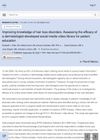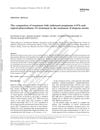7 citations,
December 2021 in “Pharmaceutics” The nanoemulsion with garlic oil, apple cider vinegar, and minoxidil could effectively treat alopecia areata.
 7 citations,
July 2022 in “Pharmaceuticals”
7 citations,
July 2022 in “Pharmaceuticals” Pumpkin Seed Oil in niosomes may help treat hair loss and improve hair growth.
1 citations,
February 2023 in “Applied sciences” The new topical growth hormone formula has high skin penetration and bioavailability.
1 citations,
August 2005 in “Springer eBooks” Alopecia areata is an autoimmune disease with genetic links, treatable with certain medications, and can affect mental health.
 1 citations,
December 2022 in “JAAD international”
1 citations,
December 2022 in “JAAD international” Social media videos made by dermatologists significantly improved patient knowledge about hair loss.
January 2023 in “International Journal of Trichology” The hemp extract significantly increased hair regrowth in both men and women without any side effects.
6 citations,
September 2022 in “Vaccines” Some people developed alopecia areata after COVID-19 vaccination, but it's not caused by the vaccine and most improved with treatment.
48 citations,
June 2003 in “Journal of Investigative Dermatology Symposium Proceedings” Contact sensitizers like DCP and SADBE are the most effective treatments for alopecia areata.
 August 2024 in “Journal of Cosmetic Dermatology”
August 2024 in “Journal of Cosmetic Dermatology” Injectable treatments can effectively and safely improve hair growth in adults with androgenetic alopecia.
1 citations,
February 2024 in “Pharmaceutics” Nanovesicles improve drug delivery through the skin, offering better treatment outcomes and fewer side effects.
 July 2023 in “Journal of Cutaneous and Aesthetic Surgery”
July 2023 in “Journal of Cutaneous and Aesthetic Surgery” Combining platelet-rich plasma with other treatments may improve hair growth in people with hair loss, but more research is needed.
 27 citations,
September 2018 in “Medicines”
27 citations,
September 2018 in “Medicines” Oleic acid nanovesicles improve minoxidil absorption in hair follicles for alopecia treatment.
 March 2024 in “Clinical and experimental dermatology”
March 2024 in “Clinical and experimental dermatology” Topical corticosteroids may be a safe and effective treatment for severe alopecia areata in children.
 May 2021 in “Lasers in Surgery and Medicine”
May 2021 in “Lasers in Surgery and Medicine” Minoxidil and photobiomodulation together improve hair growth better than minoxidil alone.
 20 citations,
January 2012 in “International journal of trichology”
20 citations,
January 2012 in “International journal of trichology” Steroids are the best treatment for Alopecia Areata with few side effects.
 5 citations,
July 2003 in “Drug Development Research”
5 citations,
July 2003 in “Drug Development Research” Fluridil promotes hair growth safely and effectively for androgenetic alopecia.
 56 citations,
January 2007 in “Pharmaceutical Development and Technology”
56 citations,
January 2007 in “Pharmaceutical Development and Technology” Liposomes improve finasteride delivery for hair loss treatment, making it a promising option for topical use.
 47 citations,
April 2017 in “European Journal of Pharmaceutics and Biopharmaceutics”
47 citations,
April 2017 in “European Journal of Pharmaceutics and Biopharmaceutics” The new dutasteride formula can be applied to the skin, may promote hair growth, and has fewer side effects.
 13 citations,
January 2016 in “Journal of cosmetology & trichology”
13 citations,
January 2016 in “Journal of cosmetology & trichology” Alternative treatments show promise for hair growth beyond traditional methods.
 13 citations,
July 2011 in “Journal of Dermatological Treatment”
13 citations,
July 2011 in “Journal of Dermatological Treatment” Clobetasol and pimecrolimus are similarly effective for alopecia areata, but pimecrolimus has fewer side effects and is preferred for long-term use.
5 citations,
January 2020 in “Acta dermatovenerologica Alpina, Pannonica et Adriatica (Tiskana izd.)” Injecting platelet-rich plasma or applying it with a laser or microneedling can treat hair loss effectively. The laser and microneedling methods cause less pain.
 166 citations,
November 1990 in “Journal of Investigative Dermatology”
166 citations,
November 1990 in “Journal of Investigative Dermatology” Minoxidil sulfate stimulates hair growth.
 11 citations,
October 2016 in “Biomedicine & Pharmacotherapy”
11 citations,
October 2016 in “Biomedicine & Pharmacotherapy” Both human platelet lysate and minoxidil can promote hair growth, but they affect different genes and cell survival rates.
 12 citations,
January 2011 in “Photodermatology, photoimmunology & photomedicine”
12 citations,
January 2011 in “Photodermatology, photoimmunology & photomedicine” This therapy effectively treats resistant alopecia areata with minimal side effects.
 144 citations,
July 2015 in “Clinical, Cosmetic and Investigational Dermatology”
144 citations,
July 2015 in “Clinical, Cosmetic and Investigational Dermatology” Alopecia areata is a common autoimmune disease affecting about 2% of people, causing significant disability and often associated with mental health issues and other autoimmune conditions.
 32 citations,
March 2020 in “Drug Design Development and Therapy”
32 citations,
March 2020 in “Drug Design Development and Therapy” Finasteride shows promise for female hair loss, but more research needed.
 7 citations,
July 2018 in “Journal of Functional Biomaterials”
7 citations,
July 2018 in “Journal of Functional Biomaterials” A new anti-baldness patch effectively treats hair loss by blocking enzymes linked to the condition.
 1 citations,
March 1997 in “Journal of the American Pharmaceutical Association”
1 citations,
March 1997 in “Journal of the American Pharmaceutical Association” Pharmacists play a key role in helping patients use over-the-counter products correctly, including those for hair regrowth and smoking cessation.
 2 citations,
December 2017 in “Bangladesh Journal of Pharmacology”
2 citations,
December 2017 in “Bangladesh Journal of Pharmacology” Black seed oil significantly protects against hair loss from chemotherapy.
 July 2018 in “Elsevier eBooks”
July 2018 in “Elsevier eBooks” Some drugs can cause reversible hair loss, but certain chemotherapy drugs may lead to permanent hair loss; drugs can also change hair color and texture.





















